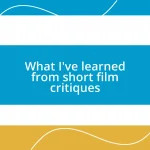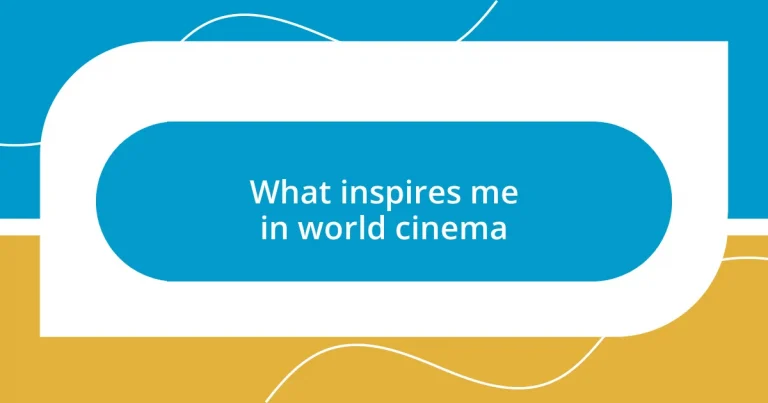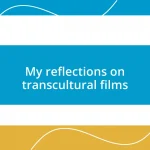Key takeaways:
- World cinema offers unique cultural perspectives, fostering empathy and personal reflection through diverse storytelling.
- Iconic directors like Quentin Tarantino and Hayao Miyazaki profoundly influence cinematic expression, creating films that resonate deeply with audiences.
- Films such as “Slumdog Millionaire” and “Parasite” provide valuable life lessons, prompting viewers to confront their beliefs and experiences regarding fate, self-discovery, and social inequality.
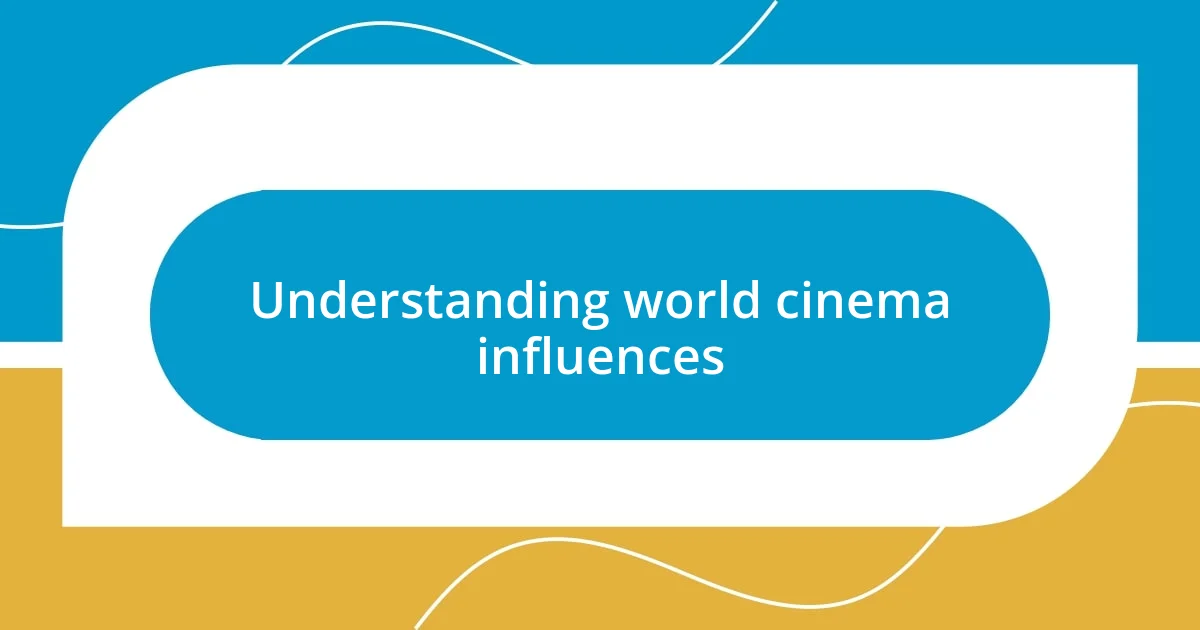
Understanding world cinema influences
World cinema, with its diverse storytelling and unique cultural perspectives, truly opens up a new realm of understanding the human experience. I remember the first time I watched an Italian neorealist film; the raw emotions portrayed felt different than anything I had seen before. It made me wonder—how does a film from halfway around the world resonate so deeply with my own life experiences?
When I explore films from different cultures, I often feel like I’m stepping into someone else’s shoes, seeing the world through their eyes. For instance, a Japanese film might intricately explore themes of honor and family, which may be conveyed differently in Western narratives. This blend of cinematic language and cultural nuance leaves me pondering how our backgrounds shape the stories we tell and consume.
The influences of world cinema extend beyond just storytelling; they challenge my perceptions and often evoke empathy in ways I hadn’t anticipated. Have you ever found yourself feeling a profound connection to a character who lives a life entirely different from yours? That’s the magic of global filmmaking—each film serves as a bridge, connecting our hearts and minds, regardless of geographical boundaries.
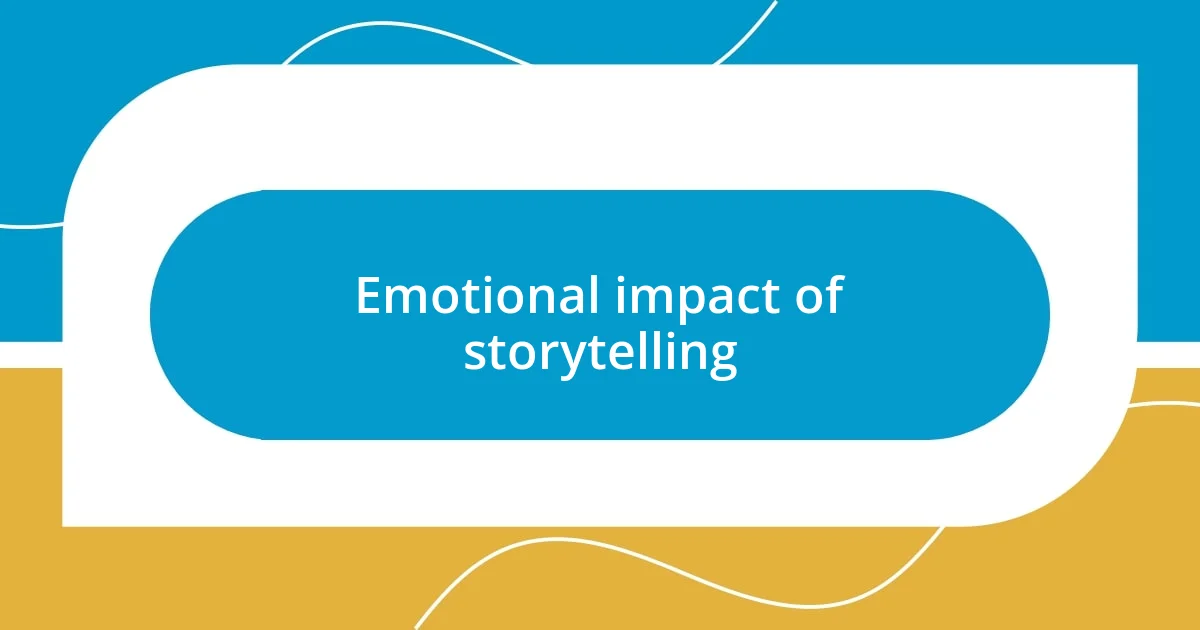
Emotional impact of storytelling
When it comes to storytelling, the emotional impact it creates is truly remarkable. I can still recall the first time I watched a heart-wrenching Indian drama that depicted grief so authentically. I was struck by how the characters’ sorrow seeped into my own heart, making me reflect on my personal losses. It’s astonishing how a film can evoke such powerful emotions across different cultures.
Storytelling is also a powerful tool for fostering connection. For example, I remember a poignant South Korean film that depicted a strained father-son relationship. The emotional weight of their journey was palpable, making me think about my own relationships and the complexities within them. This kind of reflective storytelling opens up pathways to understanding ourselves in relation to others.
A well-crafted narrative does more than entertain; it lingers in our minds and hearts. I often find myself pondering the films that have left a lasting impact—those moments when a character’s triumph or despair mirrored my own experiences. It’s a beautiful reminder of how emotion transcends cultural boundaries and connects our shared humanity.
| Key Aspect | Example |
|---|---|
| Emotional Resonance | Indian Drama experiencing grief |
| Connection to Relationships | South Korean film depicting father-son dynamics |
| Lasting Impact | Personal reflection on character journeys |
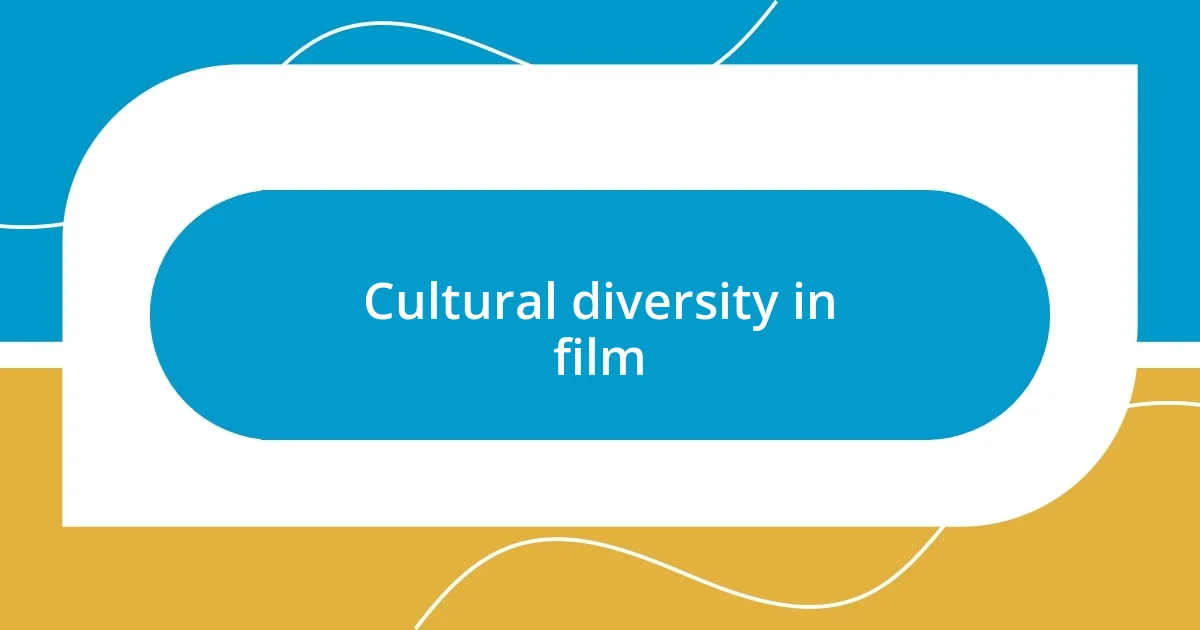
Cultural diversity in film
Cultural diversity in film is a treasure trove that enriches our viewing experiences. I vividly remember the first time I watched a vibrant Mexican festival depicted in a movie. The colors, music, and sense of community left me mesmerized, making me appreciate traditions that were once entirely unfamiliar to me. It was like being invited to a family gathering that transcended borders, where laughter and joy felt universal.
- Films showcase vibrant festivals, like Día de los Muertos in Mexico, revealing rich cultural traditions.
- Language diversity, as seen in films from countries like Finland or Brazil, opens up dialogues we might overlook.
- Storylines infused with local customs, like Indian family values, deepen our understanding of different societal structures.
- International cinema encourages the appreciation of unique aesthetics, including the silent yet powerful storytelling of Japanese films.
What truly fascinates me about culturally diverse films is how they expose hidden layers of humanity. I distinctly recall watching an intriguing Ethiopian film that revolved around societal roles and expectations. As I sat there, I found myself reflecting on gender dynamics in my own life, realizing how much we can learn about our own culture when we observe others. It’s a kind of self-discovery that only film can facilitate.
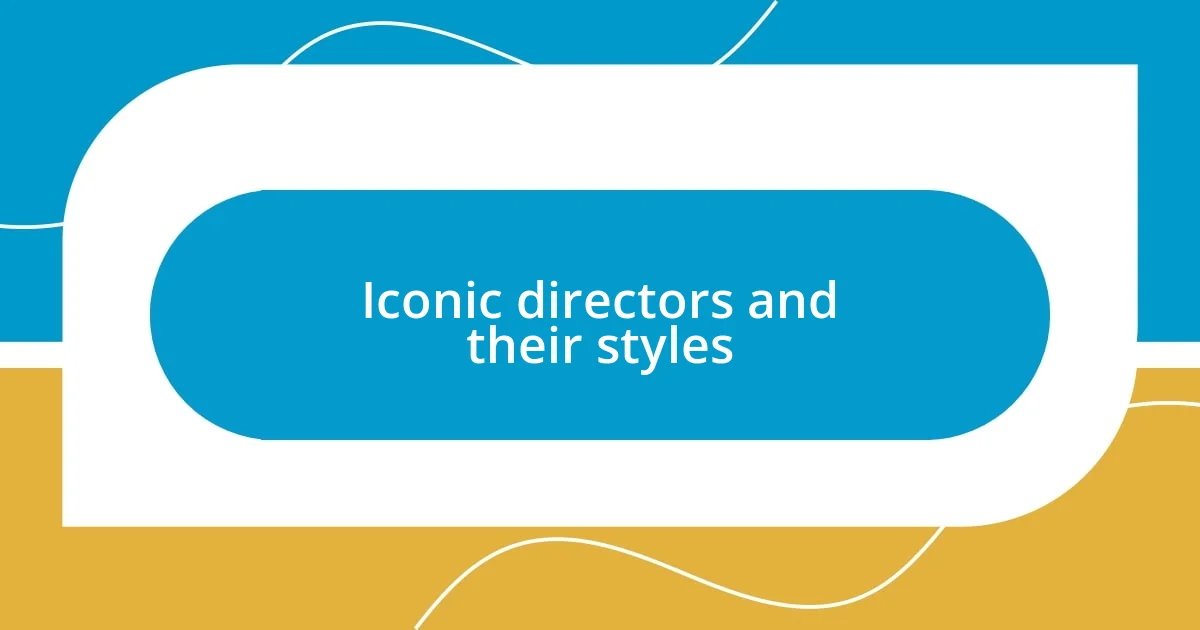
Iconic directors and their styles
Iconic directors are often the heartbeat of cinema, shaping not just their films but influencing entire generations of filmmakers. Take Quentin Tarantino, for instance; his distinctive style blends non-linear storytelling with vibrant dialogue and unique character arcs. I remember feeling a rush of excitement as I watched “Pulp Fiction” for the first time, the clever intertwining of stories made me rethink how narratives could be crafted. Isn’t it fascinating how one director’s voice can resonate so deeply?
Then there’s Hayao Miyazaki, whose films evoke a sense of wonder and nostalgia that is hard to capture. His mastery of animation brings forth beautifully detailed worlds brimming with emotion, which I experienced first-hand while watching “Spirited Away.” That film transported me to a realm where magic mingled with heartbreak. How do directors like Miyazaki manage to weave such profound themes into seemingly simple stories? It’s as if they understand the child in us, coaxing out our imaginations while planting seeds of self-reflection.
On the other end of the spectrum, we have Wong Kar-wai, who skillfully employs lush visuals and fragmented narratives. His ability to capture fleeting moments of love and loss in films like “In the Mood for Love” truly resonates with me. I found myself captivated by the silence between characters, noticing how sometimes what is unsaid speaks the loudest. Have you ever felt a connection to a film that seems to understand your own experiences of yearning and solitude? That’s the beauty of a director’s personal touch—they create not just films, but mirrors of our own hearts.
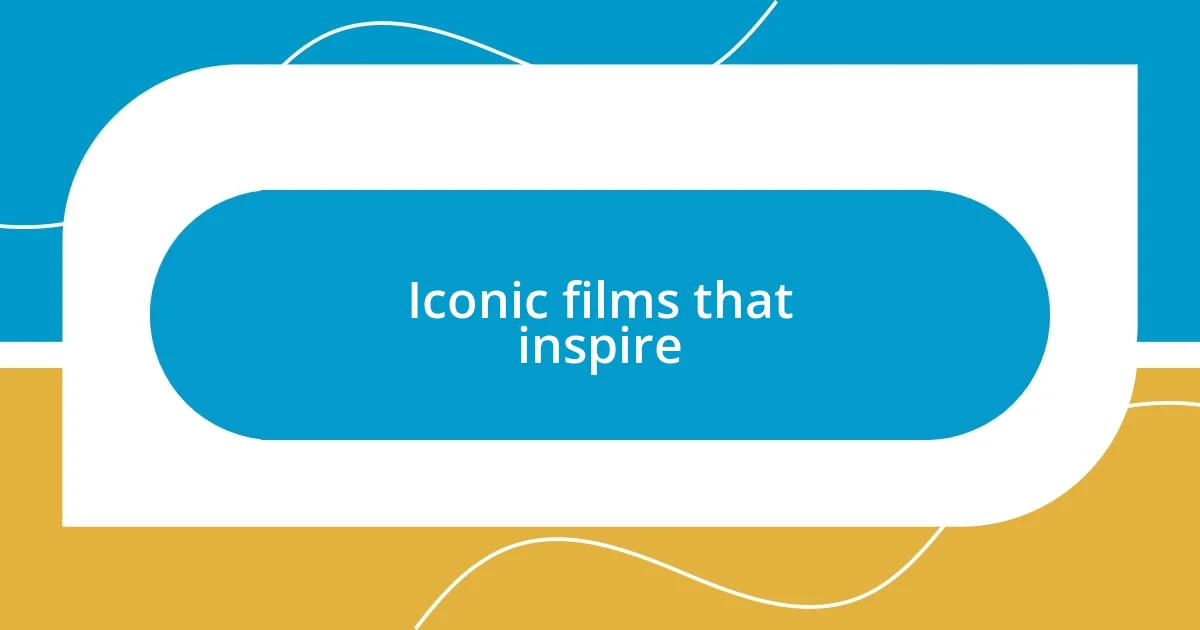
Iconic films that inspire
When I think of iconic films that inspire, “The Shawshank Redemption” immediately comes to mind. Its themes of hope and resilience resonate deeply; I can still recall the thrill of watching Andy Dufresne’s journey unfold. There’s something universally uplifting about the idea that, no matter the circumstances, the human spirit can endure—don’t you find that a powerful lesson?
Another film that sparks inspiration for me is “Life Is Beautiful.” The juxtaposition of humor and tragedy in the face of adversity always leaves me in awe. I remember watching it with friends; laughter mixed with tears emerged as we witnessed Guido’s incredible love for his son in a dire situation. It reminds me that even in the darkest moments, love can illuminate the path forward. How can such stories not touch your heart?
Then there’s “Amélie,” which paints life in the most whimsical hues. It’s striking how a simple act of kindness can transform lives, a message I carry with me every day. Watching Amélie’s gentle interactions with her neighbors encouraged me to look for beauty in mundane moments. Have you ever felt that a film has nudged you to embrace your inner dreamer? It’s these iconic stories that ignite our imagination and inspire us to see the world through a different lens.
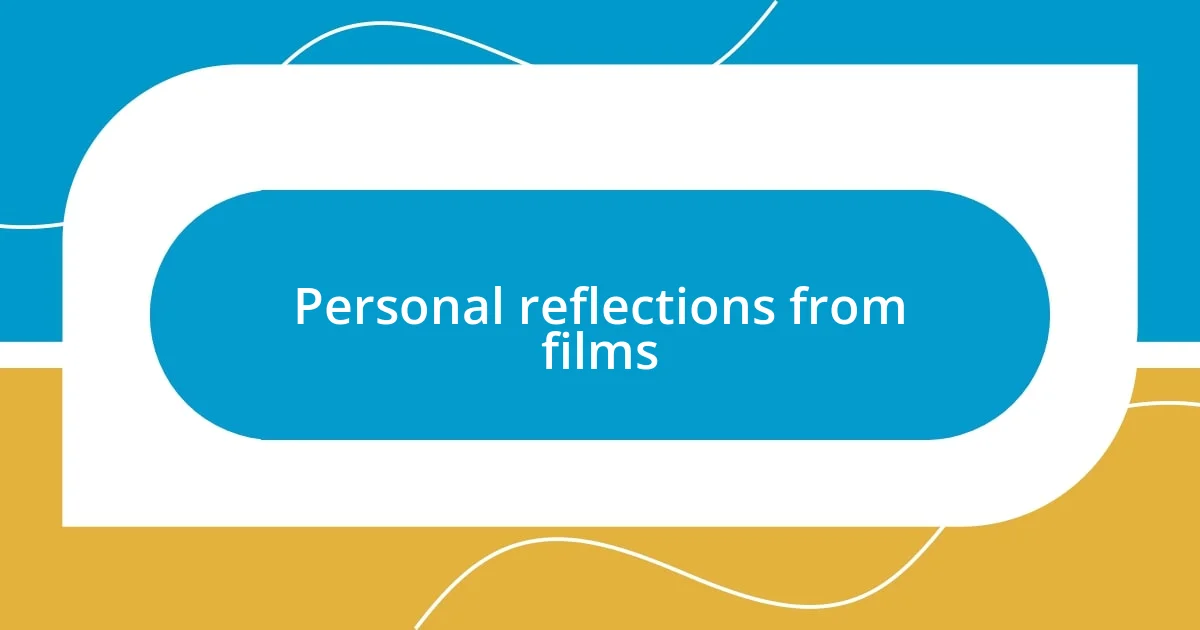
Personal reflections from films
One of the first films that truly struck a chord with me was “Eternal Sunshine of the Spotless Mind.” The intricate exploration of memory and love left me pondering the choices we make in relationships. I found myself reflecting on my own past and questioning what I would erase if I had the chance. Have you ever felt that tug on your heart when a film mirrors your own fears or desires?
Then there’s “The Pursuit of Happyness,” a powerful reminder of determination against overwhelming odds. Watching Chris Gardner’s struggles reminded me of the times I faced my own challenges and how important it is to persevere. It’s funny how a single scene can ignite a wave of motivation within you. Don’t you just love when a film shines a light on resilience and ignites your passion to chase your dreams?
Another one that resonates deeply with me is “The Secret Life of Walter Mitty.” Its beautiful portrayal of stepping out of one’s comfort zone struck me at a pivotal moment in my life. I recall finding inspiration in Walter’s adventures, feeling encouraged to embrace my own journey and seek out new experiences. Have you ever had that ‘aha’ moment watching a film, where it felt like a gentle push to explore life more boldly? That’s the magic of cinema—it invites us to dream bigger.
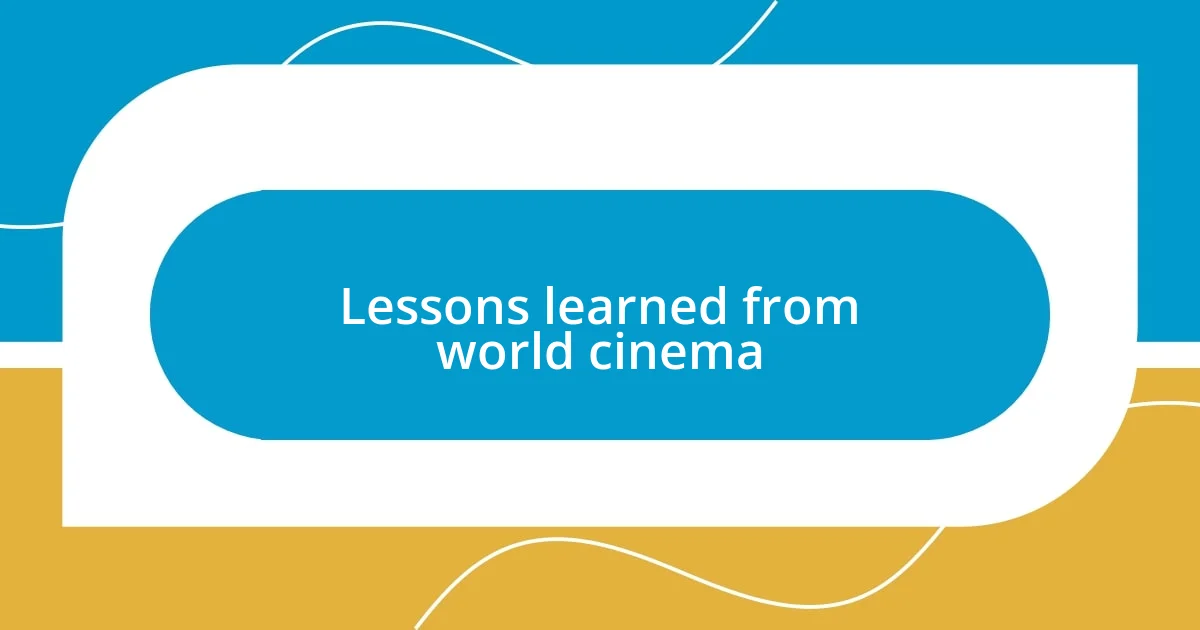
Lessons learned from world cinema
World cinema has a remarkable ability to teach valuable life lessons that resonate on a personal level. For instance, watching “Slumdog Millionaire” offered me a profound perspective on fate and the power of destiny. I remember feeling inspired by Jamal’s relentless pursuit of love and success against all odds, prompting me to contemplate how the choices we make can lead us down unexpected paths. Isn’t it intriguing how a film can shift our understanding of our own journey?
Another important lesson comes from “Spirited Away,” which beautifully illustrates the significance of self-discovery and resilience. As I watched Chihiro navigate a mysterious world, I couldn’t help but reflect on my own transformative experiences. It reminded me that sometimes, we have to lose ourselves to truly find who we are meant to become. Don’t you think that every adventure, no matter how daunting, has the potential to redefine us?
Finally, “Parasite” taught me about social inequality in such a gripping way. The film’s multi-layered narrative left me questioning my own beliefs and perceptions about wealth and privilege. I could feel a mix of discomfort and awareness, compelling me to think critically about my role in society. Isn’t it fascinating how a film can challenge our values and provoke deeper conversations? These lessons from world cinema enrich our understanding of ourselves and the world around us.


